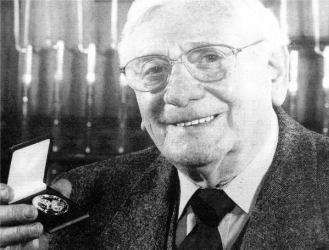
Champion piper's life draws to a close
Pipe Bands by Mervyn McConnell
PIPING Legend Henry James Denyer who made Lisburn his home almost 20 years ago passed away recently after a short illness.
Harry as he preferred to be known was a familiar figure in the city where he settled after spending many years in London.
His death came just two years after he received what he regarded as his greatest 'prize' - the silver Balvenie Medal for Services to Piping.
This was presented at Blair Atholl, Pitlochry following renditions by the world's top ten players during the Glenfiddich Competition.
Harry knew them all and they gave him a rousing time at the following Ceilidh.
Many in the piping world regarded it as a fitting tribute that just one week after his death Alistair Dunn was the first Northern Ireland piper to take a gold medal at the Blair Atholl Competition.
It was a measure of the esteem in which Harry was held that two of the world's top pipers - Roddy McCleod and William McCallum Junior - flew to Northern Ireland as soon as they heard of his passing to play as his coffin arrived at Roselawn Crematorium.
Earlier his great friend Pipe Major Jimmy Knox played 'The Mist Covered Mountains' at Harry's home in Lisburn and following the ceremony at Roselawn the Pipe Major took some of Harry's remains to his beloved Blair Atholl.
Roots
Harry's roots lay in Sandy Row. He was born in Blythe Street, his mother being a Belfast woman and his father a Londoner.
The family had planned to emigrate to Canada after his brother George was born but the sudden death of his mother put an end to this and father and sons returned to London.
Harry's father found it hard to obtain work and he often recalled how his grandmother who had never gone further than Belfast City Centre travelled to London alone and brought them back to Belfast where she took care of them.
Harry was introduced to bagpipes at the age of eight while a member of the Church Lads Brigade.
During his teens he was founder member of the Robert Armstrong Memorial JP Pipe Band and as he was the oldest he was voted in as Pipe Major.
Within a year he had started to win prizes and as he became older he turned his sights to solo piping, Ceol Mor and Piobaireachd (the classic music for pipes).
In 1955 he entered the competition at the Cowall Games (Dunoon) but despite not being placed won the Cup for best dressed piper causing much amusement as he claimed most of his kit was borrowed.
Harry was indentured to Harland and Wolff where he served his time as a Mechanical Engineer.
He worked for Rolls Royce and for London Transport while continuing to go forward for competitions and winning many prizes in Scotland and England.
Harry was also involved in the film industry where he was asked to take on the role of double for Gordon Jackson in 'The Hasty Heart'.
He played the pipes in 'Whisky Galore' and '90 Days to Peking'. He sat through the latter film on many occasions to watch the 'massed pipes and drums' at the end and often fell about laughing as he was the only piper along with a lone drummer. The rest were provided by technology. His knowledge of the classic pipes took him into teaching and judging competitions while still playing.
He was a popular member of the Scottish Piping Society of London and on his decision to return to Northern Ireland in 1987 was presented with a silver buckle and belt which were never far from his sight.
At home in Lisburn he lectured and tutored the bands of the Ninth UDR and Second RIR Battalions for almost 12 years.
In 1989 he and his close friend James McDonald of Dromore formed the first Scottish Piping Society of Ulster to promote the solo playing of Piobaireachd, marches, spey and reels.
But despite receiving sponsorship from Grants Distillers sadly the society folded in 1995.
This may have happened because this disciplined type of piping was in its infancy in Northern Ireland.
But during its six year existence the Society gave many people a taste for this particular form of playing.
Ulster Star
03/11/2006

